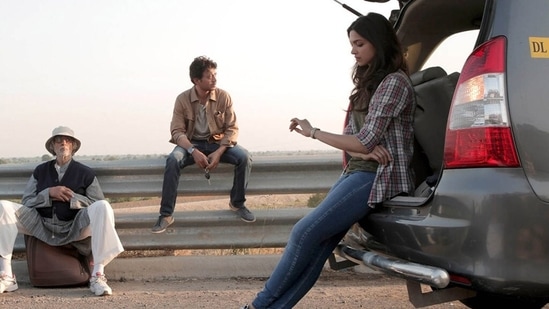10 years of Piku: Shoojit Sircar's slice-of-life film refuses to age
Starring Amitabh Bachchan, Deepika Padukone and Irrfan, Piku is that rare and once-in-a-lifetime film that remains as fresh as ever even after 10 years.
Shoojit Sircar's Piku released in the summer of 2015, and clocked a decade this year. I have this distinct memory of watching the film in a theatre, and coming out of it with a strange mixture of joy and sadness. In the theatre, someone had groaned at the last scene and said it out loud that the film ended just like that. Like a question mark was missing somewhere. How did it have all the answers? Piku and Rana simply play badminton, and she tells the house help start work from the next day. Just that. No grand gestures, no emotional outbursts. Over the years, it is this sense of an ending that has always pulled me towards this intelligent little film, a rare story that feels as fresh now as it felt those years ago.

The story of Piku and Bhaskor
Piku is a father-daughter story. Deepika Padukone's titular protagonist is no heroine, neither does she want to be one. She is just a regular woman trying to do her job and take care of her father. It is a different kind of pain for her that her father Bhaskor (Amitabh Bachchan) is a hypochondriac, and is forever complaining about constipation. The deeply perceptive script by Juhi Chaturvedi is the film's sharpest weapon, as the viewer is instantly placed within the dynamic of these two people without forcing any formal cliches to introduce them first. Her day begins and ends in the worry of whether her baba is doing okay, that he has had his medicines on time.

This overt sense of responsibility that Piku has for Bhaskor has turned her into this inevitable mother-figure; fierce and uncompromising. Sircar's film nails this specificity of emotional distance that grows over time in an Indian household; as the child grows up to be an adult, and unexpectedly it is the parent who has now become the unruly child. Bhaskor and Piku's constant bickering may be fodder for many giggles, but the one aspect that has stayed with me even from the first watch is how Piku's anger and general frustration spills over to her other relationships- both personal and professional.
It is this indistinguishable sort of temperament that Piku has, which still hits home for me. Piku never accepts- even when Irrfan's Rana spells it out to her later- but Bhaskor has always been overbearing and difficult. Juhi Chaturvedi's fearless script shows how emotionally distant the modern Indian family can be. I do not recall any other Indian film that has been so pointedly specific about how exasperating yet painful it can get to watch a parent age. It is a strange sense of betrayal. When Bhaskor wants to go by road, Piku has to say yes. In a family function, Bhaskor proclaims his daughter is not a virgin in front of a stranger. She doesn't know what to say anymore so she leaves. Bhaskor demands, and Piku always gives in.

The loss of a parent
Piku is also a story about death. Or the anticipation of it. Bhaskor has a horrible medical scare one morning and for one passing moment, Piku imagines the worst. Thankfully he is okay. Later, when the worst does happen- it is a moment captured with understated acceptance. It is this moment that brings me back to the film, as Deepika's Piku simply sits beside the lifeless body of Bhaskor and caress his arm lightly. Her grief is portrayed with immense gentleness in Piku, where the sense of loss is both internal and external. The house feels lifeless and empty, the interiors suddenly so worn out.
I think Piku feels more powerful and sensitive now, after 10 years, because I have also grown up with the film. In many ways, I am like Piku in my home now. My parents have also aged, and my relationship with them has undergone a singular transformation. Exasperation is an understatement on some days. But it also breaks my heart to see them age, and occasionally I find myself thinking what will I do when they are no more? What will it feel like? Piku is one film that helped me realise that perhaps there is grace in the acceptance that our parents will eventually leave, and that we have to still continue to live. The other day, my father met with an accident, and arrived home with his feet bandaged. Both of us refused to talk for the entire day. I wonder how long will it take for him to get well. I wonder how long can I remain angry.
No one tells Piku how to live life after Bhaskor is no more. Rana's company is the film's last comforting shot, an assertion that she will be okay. In my mind, she and Rana are now settled. Both of them perhaps still make it a point to play badminton in the mornings. But that's secondary. Piku is one such film that reminds its viewer, over and over again, that life goes on. Chances are taken and circumstances change. There's joy and loss and so much more, but thank god there is never a blueprint.
Get more updates from Bollywood, Taylor Swift, Hollywood, Music and Web Series along with Latest Entertainment News at Hindustan Times.
Get more updates from Bollywood, Taylor Swift, Hollywood, Music and Web Series along with Latest Entertainment News at Hindustan Times.





